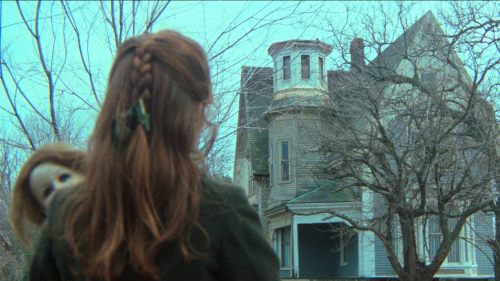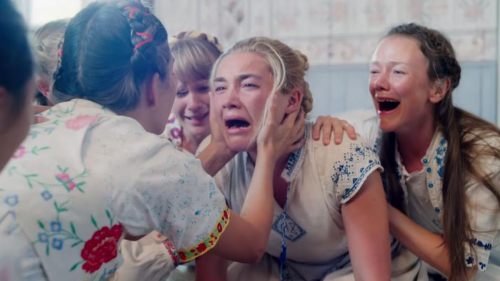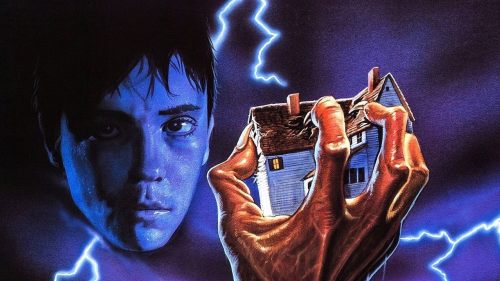The Savage Stack - THE HOUSE BY THE CEMETERY (1981)
There’s always going to be – for lack of a better term – a stack of films we’ve been meaning to get to. Whether it’s a pile of DVDs and Blu-rays haphazardly amassed atop our television stands, or a seemingly endless digital queue on our respective streaming accounts, there’s simply more movies than time to watch them. This column is here to make that problem worse. Ostensibly an extension of Everybody’s Into Weirdness (may that series rest in peace), The Savage Stack is a compilation of the odd and magnificent motion pictures you probably should be watching instead of popping in The Avengers for the 2,000th time. Not that there’s anything wrong with filmic “comfort food” (God knows we all have titles we frequently return to when we crave that warm and fuzzy feeling), but if you love movies, you should never stop searching for the next title that’s going to make your “To Watch” list that much more insurmountable. Some will be favorites, others oddities, with esoteric eccentricities thrown in for good measure. All in all, a mountain of movies to conquer.
The forty-third entry into this unbroken backlog is Lucio Fulci's gory, nonsensical Shining rip off, The House By the Cemetery...

Considered by many to be his defining works, Lucio Fulci’s "Gates of Hell" trilogy begins with the fog-drenched Gates of Hell ('80) (a/k/a City of the Living Dead) (during which a priest's stare causes a woman to puke out her own intestines), peaks with The Beyond ('81) - undoubtedly Fulci’s absolute best motion picture - and then comes down with the relentlessly inelegant (yet still overwhelmingly sad) House By the Cemetery ('81). It’s an absurd trio that stands up against some of the very best Italo-sleaze produced in the country’s history, and the fact that these films were practically put into production months apart from one another is utterly remarkable. Shock enabler Fabrizio De Angelis (1990: The Bronx Warriors ['82]) played an integral part in producing two thirds of the diabolical triptych, however Fulci is going completely next level bombast with each entry. These are movies that ride in on a steamroller, as the director lenses them with a tweedy goth attention to delivering spiders, gore, and a better trip than most psychadelics sold in the theaters showing them could offer. In short, the "Gates of Hell" pictures were essential viewing for horror and exploitation heads.
However, its fitting (being a product of the 70s/80s Italian exploitation market) that at least one of the motion pictures involved is almost a complete rip off of an American hit. House By the Cemetery is essentially Fulci's The Shining ('80), right down to its basic plot construction. A doctor (Paolo Malco) relocates his wife (Catriona MacColl) and creepy, psychic kid (Giovanni Frezzi) from New York City to a chilly house in Boston, in order to investigate the mysterious actions of his now deceased colleague, Dr. Peterson. Their new home (which isn't really by a cemetery, but whatever, it's Italian) is a creepy old monstrosity that their kid has visions about before the family even embarks on their journey, as a young girl (Silvia Collatina) calls to him from a portrait of the looming mansion, warning him to stay away. Being a tot, he has no control over where his parents take him, and the two become friends when the little girl just happens to appear on the first street they stop on. Once a mysterious babysitter (Ania Pieroni) enters the kid's life, eerily resembling a decapitated mannequin from a nearby dress shop, we know we're trapped inside a full-blown Fulci nightmare, with no hope of ever escaping.
Narrative anti-logic abounds, as further investigation into Dr. Peterson's final days living in this haunted abode reveals he murdered his mistress before taking his own life. Essentially, he was the caretaker, if such a thing existed in Fulci's Eurotrash universe, and a murderous demon named Dr. Freudstein (who is comprised of some of the best/worst horror movie prosthetics ever whipped up), emerges from the dank dark basement and commits awful, graphic murders that rank with the most striking instances of splatter in Fulci's entire filmography. Though this may be ripping off a classic, artistically minded horror picture, Fulci is still certainly making his own scummy funhouse version of it, including a butcher's knife that goes through the back of a poor girl's head (so that the tip pokes out of her mouth) during the very first scene. The grime auteur's prized rubber bats make several appearances, terrorizing the young boy while he's in the cellar, and just generally seeming like they secretly breed inside the nooks of this old New England cave made of wood, plaster, mold and stone. Fulci drenches entire scenes with a fog machine, and cranks Walter Rizzati's horror/prog/disco score to ten, slathering each moment in a funky vibe that's both catchy and chilling in equal measure. In some ways, House By the Cemetery isn't so much a film as it's a 2D boardwalk attraction, welcoming you into its gum-smelling arena of pain, but never promising that you'll exit.
Yet what causes House By the Cemetery to stick to your ribs long after those final, thunderous piano chords signal the trademark Italian block credits' oncoming roll, is the intense melancholy that hangs over the picture like a grey, Northeastern snowstorm cloud. Fulci may have been one of the great schlock maestros to ever live, but there was a perverse depression that permeated each frame of even his most horrific works. Fulci was haunted by the deaths of both his wife Maria (who took her own life following a terminal cancer diagnosis), and daughter, who was killed in a car wreck a few years after, as well as being troubled by severe bouts with diabetes (rendering his feet near unusable at times). He was an ailing artist, and both his mental and physical sicknesses bled their way into his sleaze operettas. In particular, the "Gates of Hell" trilogy showcased characters suspended in an eternal purgatory, as if conveying Fulci's desire to drift off this plane and join whatever spirits awaited him in the afterlife. He was a trash cinema lunatic with a spiritual side, obessed with eyes and souls in equal measure, knowing that the damned weren't just terrifying, but also dreadfully sad.



